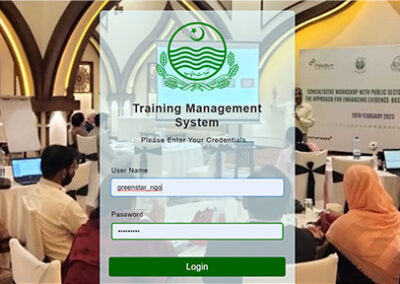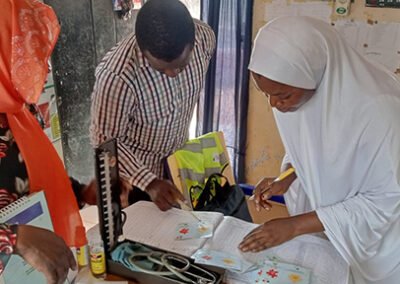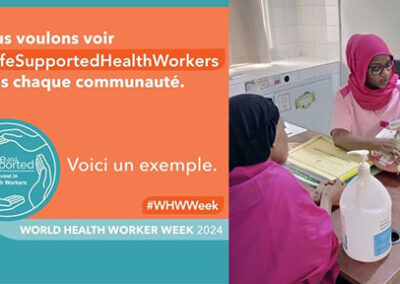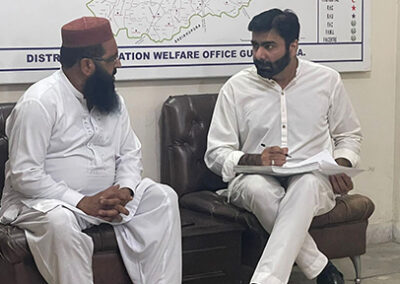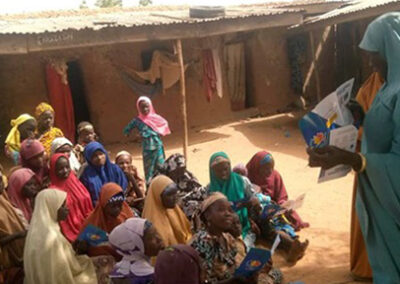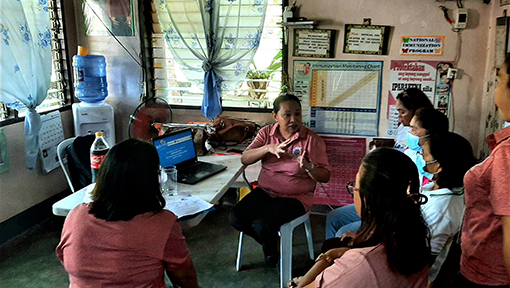
Donabelle Mutia (center) is the Health Education Program Officer and supervising nurse of the City Health Office in Dipolog City. She is also a member of TCI’s city leadership team.
While designing their adolescent and youth sexual and reproductive health (AYSRH) program with The Challenge Initiative (TCI), Dipolog City in the Philippines decided to adopt data for decision-making as a key high-impact intervention (HII). However, to successfully implement this HII, Dipolog needed to disaggregate its data by age for accurate analyses and credible advocacy.
Before TCI, Dipolog City collected and recorded data from ages 15 to 49, which prevented them from evaluating the reality of the city’s AYSRH challenges. Donabelle V. Mutia, Health Education Program Officer and supervising nurse of the City Health Office in Dipolog City and member of TCI’s city leadership team, said:
The Challenge Initiative program helped Dipolog City disaggregate our data to the following age brackets: 10 to 14 year-olds, 15 to 19 year-olds, and 20 to 49 year-olds. During the inception stages of TCI, we were made aware of TCI’s four [AYSRH] concentric circles, and we saw that data must not only be made visible, but it needs to be disaggregated.”
Mutia, along with other members of TCI’s Dipolog City leadership team – Adolescent Heath Development Program coordinator Rosie R. Serina and Family Planning Coordinator Deborrah L. Pontanar – called a general meeting with Barangay (village) Health Station (BHS) nurses, midwives and community health workers to discuss the need to disaggregate data into the three age groups (10-14, 15-19 and 20-49).
At first, there was some resistance as the process of disaggregating by age is tedious since reporting templates did not reflect the new age brackets. In addition, the regional office of the Department of Health only requires data from 15 to 49 year-olds, but the BHS eventually started disaggregation of its data by age after Dipolog City’s mayor directed them to make the health data more visible and accurate.
The city health office then revised the reporting template and inserted columns for the new age brackets. Dipolog City’s Field Health Services Information System for AYSRH now reflects data from 10 to 14 years old, 15 to 19 years old, and 20 to 49 years old.
After reporting in the new format for a period of time, the Barangay Health Station workers now appreciate age-disaggregation because they clearly see how many 10 to 14 years old and 15 to 19 years old are pregnant. It also helps them to make decisions about programs or interventions that are age-specific. The Barangay’s advocacy campaign to reduce teen pregnancy and raise awareness of sexual reproductive health is also age-appropriate now due to age disaggregation.
City health program coordinators appreciate the data for decision-making intervention became the “eye-opener” for them to disaggregate data as to age, which helped them see more clearly the gaps needed to address in the communities and the solutions to that more specifically.
Pontanar, the family planning coordinator, can now track adolescent contraceptive uptake, while Mutia and Serina, the adolescent health development program coordinator, can now see the need to advocate for AYSRH and teen pregnancy awareness campaigns targeted not only at 15-19 year-olds but also 10-14 year-olds. IEC materials also need to be adjusted to be more age appropriate.
When conducting advocacy work in schools and communities, the city now includes 10-14 year-olds and 15-19 year-olds, making AYSRH and teen pregnancy an urgent matter for all stakeholders to address, including parents in the communities.

